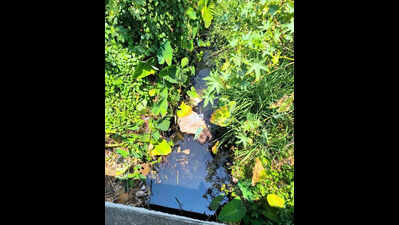- News
- City News
- coimbatore News
- NGO bets big on vetiver to keep Coimbatore’s Sundapalayam stream clean
Trending
NGO bets big on vetiver to keep Coimbatore’s Sundapalayam stream clean
Coimbatore: There is a cost-effective way to keep water bodies clean by getting rid of pollutants – growing vetiver, a perennial bunch grass. And that's exactly what Siruthuli, an NGO, is doing to keep Sundapalayam stream, where sewage is being discharged, clean.
"Setting up a sewage treatment plant (STP) is not feasible everywhere. STPs require considerable space, electricity and maintenance, making them expensive. Growing vetiver is, on the other hand, a green and environment-friendly way of treating wastewater. Vetiver's deep root system does the job of removing pollutants from water bodies," said a member of the NGO's technical wing.
He said after planting vetiver on either side of Sundapalayam stream, only regular monitoring was required. "We planted vetiver there in April 2023. We had tested water samples before its plantation. In the past two years, there is a visible improvement in the water quality. An external water testing team will be deployed to authenticate and document the improvements (in water quality) officially."
Vetiver is widely gaining recognition as a highly effective plant for forming floating treatment wetlands to keep water bodies clean. Tamil Nadu Agricultural University (TNAU) had set up a floating vetiver island at Ukkadam Periyakulam in 2024.
The TNAU team studied the sturdiness of floating vetiver island for 16 months from January 2023 to March 2024. They also created a mini pond on TNAU campus with 25,000 litres of water pumped from the Ukkadam lake to check how efficient the roots of vetiver were in removing pollutants.
End of Article
FOLLOW US ON SOCIAL MEDIA










